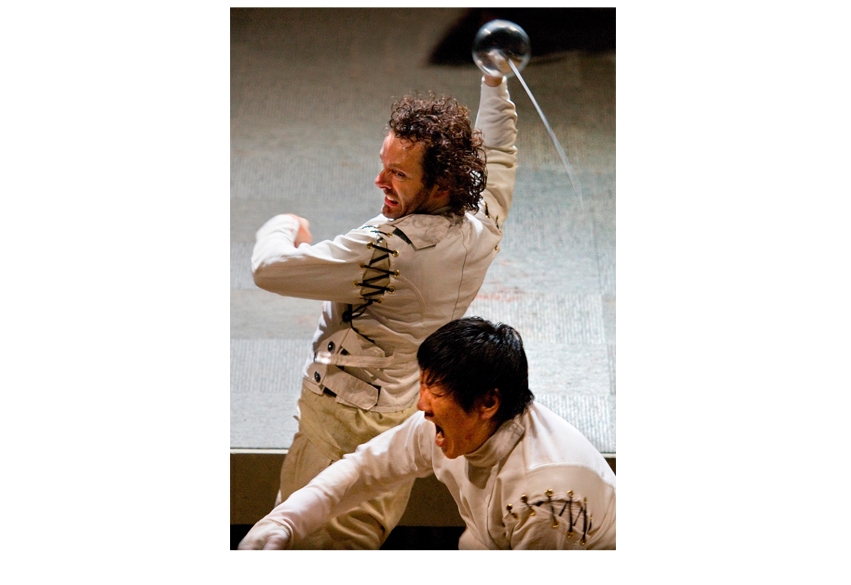‘I’m off to see a play about a man who kills his dad,’ I told my five-year-old as I left the house. ‘Because he didn’t give him any ice-cream?’ he said. Mmm, I wondered, it’s possible that Hamlet harboured some childhood grudge against Claudius over a Mr Whippy refusal episode. But such meta-textual speculation is extremely perilous. And when I reached the Young Vic I realised just how grave the danger can be.
Ian Rickson’s bumptious show sets the play in a loony bin. Banana yellow walls. Tannoy announcements. Leering staff wearing canvas security uniforms. Claudius, in a three-piece suit, setting chairs in a semi-circle for Hamlet, Gertrude and the court. Visually this is clear enough but narratively it creates disorder. Is Hamlet an inmate or an employee? Is he competing with Claudius for control of the bin? The answers to such questions are unforthcoming because no serious production would ask them.
Rickson’s asylum is the fertile parent of many blunders and orphans. The Ghost scene is done back-to-front, as a bipolar hallucination, with Michael Sheen (Hamlet) playing the Ghost but not playing Hamlet. Out goes the tension, the poetry and the intricate creeping sense of doom. Out goes the clarity, too. The Ghost’s appearance represents ‘the inciting incident’, as Hollywood terms it, when the hero is given his dramatic task. If played as a solo scene it simply crocks the entire mechanism. Because Sheen isn’t playing Hamlet he can’t show us the character’s astonishment and horror at the discovery of his father’s murder.
‘Oh my prophetic soul, my uncle!’ That melancholy and awesome line is missing. As is another vital utterance. ‘Alas, poor ghost.’ If ever a phrase could be said to herald a shift in the development of civilisation, there it is. ‘Alas, poor ghost.’ A world that can move from fear of spirits to sympathy for them has taken a decisive step towards denying their existence altogether. Those three words mark the moment when the values of the Enlightenment first glimmer in northern Europe. But this show doesn’t understand any of that. It prefers the loony bin.
Sheen plays the Ghost atrociously, clamouring the lines like a road-rage victim and entirely missing their beauty and their magnificent tolling music. His Hamlet is much better, a sweet, confused, charismatic angel. But he’s dressed in a tramp’s overcoat and a nest-of-coat-hangers haircut so he looks like Marc Bolan, on speed, trying to find his way out of a squash club. The lesser roles have been cast with wilful silliness. Claudius (James Clyde) lacks menace and looks younger than Hamlet. Hayley Carmichael, as Horatio, is openly flirtatious in all her exchanges with the prince. Perfect nonsense. Rosencrantz is played by another romantically interested female, which doubles the problem. It turns Hamlet into a royal sex-athlete who regards Ophelia (a tense-looking Vinette Robinson) as his third choice in the palace beauty contest. Haphazard vandalisations multiply. The Mouse-Trap is played for laughs and collapses into a muddled gag about a vacuum hose. Ophelia’s burial is presented in a sandpit and begins with the murdered Polonius, still in his Polonius costume, clambering from underground to play the priest. What? Ophelia is buried by her resurrected father! We’re back to the loony bin.
Rickson even manages to mishandle Osric. This is the best cameo in Shakespeare, and a role all actors crave because it offers a great chance to lock horns with the star playing Hamlet. Osric, a conceited ponce, is a sensational piece of stagecraft, too. His arrival gently lowers the tension and settles our nerves before the play’s terrible climax. He adds texture to Elsinore by showing us a courtly fop in contrast to the schemers and killers elsewhere. And the scene colours Hamlet in a strange light, making him seem petty and superior. ‘Dost know this water-fly?’ he says to Horatio when Osric shows up. But that line is ditched, too, because Osric — and I can scarcely believe I’m writing this — is played by Horatio. Or is he played by Ophelia? Or by the girl playing Rosencrantz? Christ knows. By a girl, anyway, still confusingly attired in her loony-bin casuals. A production that botches Osric deserves to be closed down by a squad of Shakespearean stormtroopers under my personal supervision.
The pity of it is that Sheen will draw crowds of youngsters and first-timers to a show that presents Shakespeare’s noblest achievement as scrawl, mayhem and ugliness. When they leave the Young Vic they’ll avoid plays on principle. Some shows are bad. This is poison. It requires a new genre of literature to correct its horrors. I’ve offered 800 words. Really, I’d need 20,000.






Comments